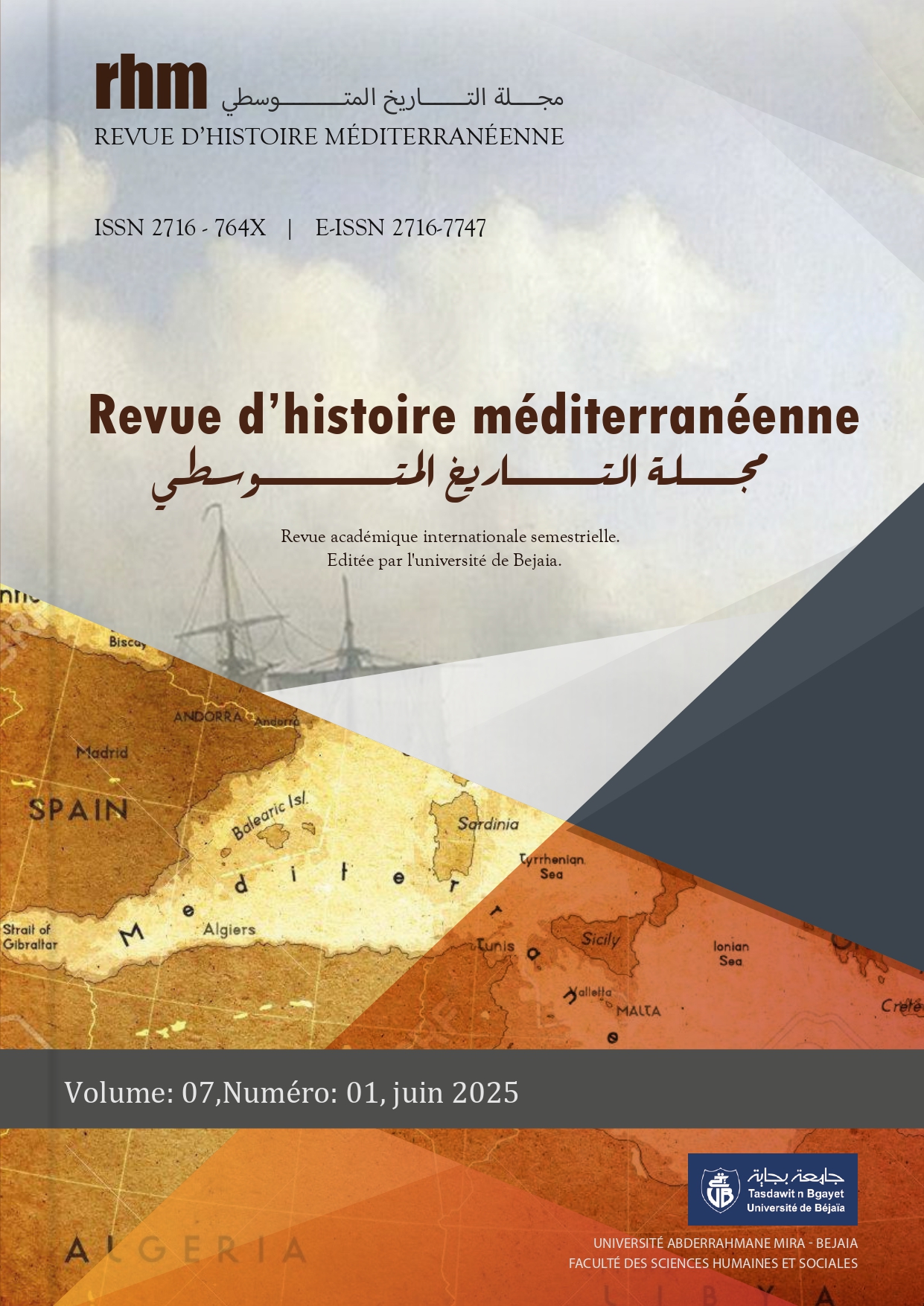إمارة باري الإسلامية في الجنوب الإيطالي (226- 257ه/ 841- 871م)
The Islamic Emirate of Bari in Southern Italy (226-257 AH / 841-871 CE)
Résumé
مهّد الصراع الإسلامي المسيحي على أراضي صقلية، الطريق أمام المسلمين للتوغل في البر الإيطالي ورغم صعوبة الوضع، فقد نجح المسلمون في إنشاء إمارات إسلامية بالجنوب الإيطالي، من ابرزها إمارة باري التي استمر تواجدها مدة ثلاثين سنة، وتعاقب على حكمها ثلاثة أمراء، كانوا في حالة صدام دائم مع المسيحيين بتلك النواحي، أحسنوا استغلال الظروف وانتهاز الفرص لتثبيت تواجدهم في هذه البيئة العدائية، وترويض ممالك الجوار المسيحية، كما تمكنوا من الحفاظ على الروابط التجارية والحيوية الاقتصادية للإمارة التي كان مجتمعها فسيفساء عرقية وبشرية، هذا فضلا عن مساعي أمرائها لتحصيل الإعتراف من الخلافة بإمارتهم وباستقلاليتها عن كل القوى الأخرى.
إنّ هذه المدينة / الإمارة التي تأسست وسط بيئة معادية تضُجّ بالصراعات والدسائس قد نجحت إلى حدّ ما في تصدير صورة عن الحكم مغايرة للنمطية التي سادت الجنوب الإيطالي آنذاك، أبرزت هذه الصورة العبقرية والتميز الحضاري للمسلمين الوافدين، ومن مرام هذه الدراسة توضيح مدى تسبب حالة التشظّي والتشرذم ونزاعات المسيحيين مع بعضهم البعض في التمكين للمسلمين من بسط هيمنتهم بشكل طارئ على باري وتوجيه مُجريات الأحداث من خلالها، هذا التساؤل المحوري الذي صحبته عدة تساؤلات فرعية لتجلية غوامض الأحداث المُرتبطة بتاريخ هذه الإمارة، تتمحور حول الآليات التي من خلالها نجح المسلمون في إرساء دعائم حكمهم، وبدائل الحكم التي قدّموها، وعن تظافر الجهود الصليبة وتوحيد صفوفهم للتخلص من هذه الإمارة الإسلامية.
استعنت على هذا العمل بعدد من المصادر والمراجع، ككتاب فتوح البلدان لمؤلفه أحمد بن يحي البلاذري، الذي عاصر فترة نشوء هذه الإمارة، بالإضافة إلى ما ذكره ابن الأثير عنها في مؤلفه الكامل في التاريخ، أما ما كتبه ميكيلي أماري في مؤلفه الضخم تاريخ مسلمي صقلية فاحتوى على معلومات أكثر شمولية وتفصيل، في ظل استعانته لتدوين عمله بأصول لاتينية وعربية جد مهمة تعود لتاريخ تلك الحقبة، هذا بالإضافة إلى ما دونه محمد الطالبي من معلومات حولها في عمله الموسوم بالدولة الأغلبية –التاريخ السياسي- وما أورده أحمد عزيز في مُنجزه المعنون بتاريخ صقلية الإسلامية، وأغلب هذه المراجع ذكرت محطات من تاريخ هذه الإمارة عرضا وليس من باب التركيز على دراستها.
رغم النزر القليل من المعلومات الذي امتلكناه حول هذه الإمارة فإننا عمدنا إلى التنقيب عن تاريخها مع إعمال النقد والتحليل للمادة التاريخية المتوفرة تجنبا للوقوع في الزلل، أما عن أبرز مُخرجات هذه الدراسة فكانت أنّ الصراعات المسيحية هي من فتحت منفذا ساعد المسلمين للتوغل والإستقرار بالجنوب الإيطالي، بعد نجاح "خلفون البربري" في السيطرة على مدينة باري وإنشاء إمارة إسلامية بها، أثخّن أمراؤها في الممالك المسيحية المُجاورة لها واجبروهم في كثير من المحطّات على الرضوخ والتبعية، سعت لترسيخ جذور الإسلام وأركانه بالمنطقة، كما لم تعمل على كسب ود أي قوة سياسية أخرى ياستثناء الخلافة العباسية، وفي ظل المساعي المسيحية لاستئصال هذا الكيان الطارىء، حُشدت القوى وأبرمت الإتفاقيات بين الفرنجة والبيزنطيين وفُرض حصار رهيب على إمارة باري، كل هذا لم يكن ليقضي عليها لولا ذلك الخذلان الرهيب وإنعدام أدنى أشكال الدعم الذي تعرضت له باري من طرف القوى الإسلامية المجاورة،على غرار الدولة الأغلبية التي وقفت موقف المتفرج من تلك الحملة الصليبة المسعورة ضد الإمارة الإسلامية.











